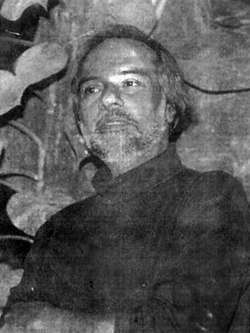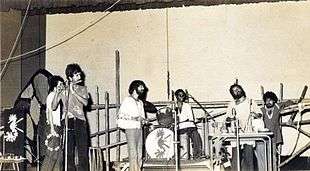Gautam Chattopadhyay
Gautam Chattopadhyay (1 June 1948 – 20 June 1999) was an Indian Bengali singer, songwriter, bassist, and composer.[1] In 1975, as a leader he co-founded the progressive rock band Moheener Ghoraguli with songwriter Tapas Das, pianist Abraham Mazumdar, bassist Pradip Chatterjee, lyricist Ranjon Ghoshal, drummer Biswanath Bishu Chattopadhyay and guitarist Tapesh Bandopadhyay.[2] He was also a theatre person, filmmaker and ethnographer.
Gautam Chattopadhyay | |
|---|---|
 Gautam Chattopadhyay, the founder of Moheener Ghoraguli | |
| Background information | |
| Birth name | Gautam Chattopadhyay |
| Born | 1 June 1948 India |
| Died | 20 June 1999 (aged 51) Kolkata, India |
| Genres | Bangla folk rock |
| Occupation(s) | Musician, singer, music programmer |
| Instruments | Vocals, guitar, saxophone |
| Years active | 60s–1999 |
| Associated acts | |
| Website | gautamchattopadhyay |
He played many Indian and Western instruments. During his college years he played lead guitar in a band called The Urge, whose members were mostly Anglo Indians, in pubs including Trincas and Moulin Rouge at Park Street of Kolkata during the 1960s.

While a student at the Presidency College in Kolkata, he participated in the political movement of the late 60s and early 70s in Bengali campuses known as the Naxal Movement.[3] He then moved to Jabalpur, working for about a year as a Medical representative in Jabalpur and then in Bhopal. He continued composing music during this phase of his life.
Chattopadhyay returned to Kolkata, and formed a band called Saptarshi with his brothers Pradip Chattopadhyay, Biswanath (or Bishu) Chattopadhyay, first cousin Ranjon Ghoshal, Biswanath's friend Abraham Mazumder, and family friends Tapesh Bandopadhyay and Tapash Das. Later they called themselves Moheener Ghoraguli. He worked with the 'Bauls'Fakirs, creating a new genre of music, 'baul-jazz'. Chattopadhyay introduced new lyrics and the guitar, saxophone and drum set.
Moheener Ghoraguli was not commercially successful at the time, and the band disintegrated in 1981. During the mid-nineties, Chattopadhyay revived Mohiner Ghoraguli by releasing the albums Abar bachhor kuri pore (1995), Jhara shomoyer gaan (1996), Maya (1997), and Khepar gaan (1998). He included new singers and his own compositions, as well as songs composed by others.[4]
Later, Chattopadhyay continued a solo career, composing new songs, composing music for his own films and working as music director for other film-makers. His films include Nagmoti (which won the President's Medal at the National Film Awards in 1983). His second feature film was Somoy (which was never released) A Letter to Mom, an English film on the life of the Anglo Indian community.
His first documentary was about the dhakis (drummers) of Bengal called The Primal Call. After that he made several documentaries, including 'The Dinosaurs, The sun temple of konarak to Mr Habib Tanvir. He made a short film for American community television program To Love is to Paint...
Chattopadhyay went to Karbi-Anglong in the mid-nineties to work with the Karbi people and their music. With them he did an opera on their folklore called Hai-mu.[5] About 300 Karbi youth performed in this opera. He then began to make a film in Karbi language, which remained incomplete due to his sudden death in 1999.
Discography
Posthumous
- Mohin Ekhon O Bondhura (2015)
Filmography
As director
- Nagmoti (1983)
As music director
- Kichhhu Sanlap Kichhu Pralap (1999)
- Nagmoti (1983)
- Bhalobasa O Andhakar (1982)
Awards and nominations
| Year | Award | Category | Outcome | Capacity | Work | Notes |
|---|---|---|---|---|---|---|
| 1983 | National Film Awards | Best Feature Film in Bengali | Won | Director | Nagmoti | [6] |
References
- "Goutam Chattopadhyay movies, filmography, biography and songs - Cinestaan.com". Cinestaan. Retrieved 28 March 2019.
- "Song of the stallion". The Times of India. 21 June 2009.
- "Finding the lost sound of a generation". The Hindu.
- "An asthma patient, Gautam Chattopadhyay performed somersaults on stage". Times of India. Zinia Sen, TNN | 11 February 2014
- Seagull Theatre Quarterly. Seagull Foundation for the Arts. 1996. p. 49.
- "30th National Film Awards" (PDF). Directorate of Film Festivals. Retrieved 4 October 2011.